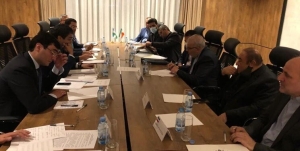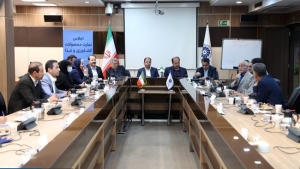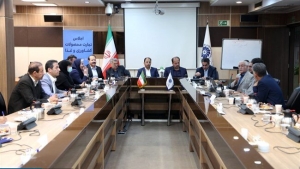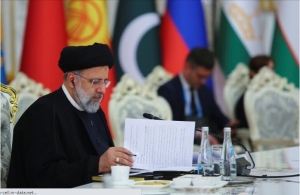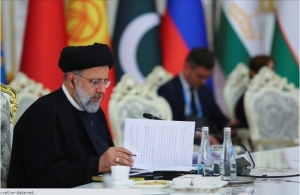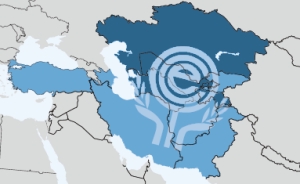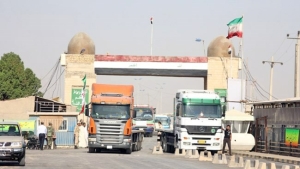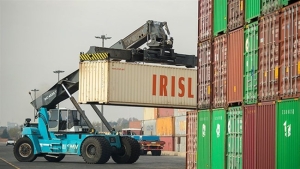Member Countries
ecocci
Iran, Uzbekistan ink MOU on energy co-op
TEHRAN- Iran and Uzbekistan signed a memorandum of understanding (MOU) on cooperation in different energy sectors, Fars news agency reported on Sunday.
As reported, the MOU was signed by Iran’s Oil Minister Javad Oji and Uzbekistan’s Acting Energy Minister Azim Ahmed Khojayev on the sidelines of the 22nd Shanghai Cooperation Organization (SCO) summit in Uzbekistan.
In this meeting, the high-ranking delegations of Iran and Uzbekistan discussed joint implementation of petrochemical projects in Iran, conducting geological and exploration activities in the field of oil and gas, supply of Iranian petrochemical products in Uzbekistan, exchange of crude oil and petroleum products, and joint research for the development and commercialization of catalysts and chemicals for petrochemical plants.
Providing financial aid and supporting banking cooperation for the development of oil, gas and petrochemical industries in both countries, providing equipment needed by the oil and gas industry, cooperation in the field of creating and providing laboratory equipment and exchange of knowledge in the field of oil and gas industries, as well as the training of skilled manpower in the oil industry were also agreed upon.
ICCIMA stresses expanding extraterritorial agricultural co-op with neighbors
TEHRAN – Members of Iran Chamber of Commerce, Industry, Mines and Agriculture (ICCIMA)’s Agriculture Committee, in a meeting on Monday, stressed the need for the expansion of agricultural cooperation with the countries in the region especially the neighbors, the ICCIMA portal reported.
During the meeting, which was chaired by Head of ICCIMA Agriculture Committee Mohsen Amini and Deputy Head of Iranian Parliament’s Agriculture Committee Rahmatollah Norouzi, agricultural development with a focus on regionalism and optimal use of resources was emphasized.
The attendees of the gathering stressed that in order to achieve economic development in the country, oil should not be seen as the sole source of income and it is necessary to use oil revenue as a driving force for other productive sectors.
Speaking at the meeting, Norouzi underlined the importance of determining certain policies for agricultural development and food security in the country and stated: “The conflict between Russia and Ukraine showed well how much investment should be made to ensure food security. This issue requires resources and expert studies.”
Amini for his part noted that the only way to commercialize agriculture in the country is to use the capacities of leading and capable private companies and emphasized: “In this regard, we should not start the work from scratch, but we should take advantage of the existing global experiences and advancement.”
He further said the government should not take over extraterritorial cultivation, adding: “An arrangement should be made to increase interaction between the government and the private sector in this regard. Undoubtedly, in the light of these relationships, the basis for making the right decisions and achieving goals is created.”
ICCIMA stresses expanding extraterritorial agricultural co-op with neighbors
Members of Iran Chamber of Commerce, Industry, Mines and Agriculture (ICCIMA)’s Agriculture Committee, in a meeting on Monday, stressed the need for the expansion of agricultural cooperation with the countries in the region especially the neighbors, the ICCIMA portal reported.
During the meeting, which was chaired by Head of ICCIMA Agriculture Committee Mohsen Amini and Deputy Head of Iranian Parliament’s Agriculture Committee Rahmatollah Norouzi, agricultural development with a focus on regionalism and optimal use of resources was emphasized.
The attendees of the gathering stressed that in order to achieve economic development in the country, oil should not be seen as the sole source of income and it is necessary to use oil revenue as a driving force for other productive sectors.
Speaking at the meeting, Norouzi underlined the importance of determining certain policies for agricultural development and food security in the country and stated: “The conflict between Russia and Ukraine showed well how much investment should be made to ensure food security. This issue requires resources and expert studies.”
Amini for his part noted that the only way to commercialize agriculture in the country is to use the capacities of leading and capable private companies and emphasized: “In this regard, we should not start the work from scratch, but we should take advantage of the existing global experiences and advancement.”
He further said the government should not take over extraterritorial cultivation, adding: “An arrangement should be made to increase interaction between the government and the private sector in this regard. Undoubtedly, in the light of these relationships, the basis for making the right decisions and achieving goals is created.”
Iran eyes free trade with SCO member states
TEHRAN – Head of Iran’s Trade Promotion Organization (TPO) Alireza Peyman-Pak said that President Ebrahim Raisi has stressed the need for establishing Free Trade Agreements (FTAs) with members of the Shanghai Cooperation Organization (SCO), the TPO portal reported.
Making the remarks in an interview with the national TV, Peyman-Pak pointed to the significance of removing the barriers to financial and banking exchanges with the SCO member countries, saying: “During President Raisi’s meetings with the presidents of some SCO members, the development of trade and the removal of obstacles and challenges were emphasized.”
“We have had a good experience with the Eurasian Economic Union (EAEU); 80 percent of the process [for reaching an FTA with EAEU] has been completed and we will finalize technical discussions in December and the draft of the agreement will be sent to the parliament for approval,” the TPO head said.
“Since most of the Eurasian countries are also members of the Shanghai Organization, the president suggested that we pursue establishing free trade agreements in the Shanghai area as well,” Peyman-Pak added.
In the meetings that were held during the SCO summit in Uzbekistan, the presidents of the members of the pact, the monitoring members, and the partners all put forward good words in this regard, the official said.
“Regarding financial and banking issues with countries like Russia, Belarus, and Kazakhstan, we have taken good measures to use alternative routes. Also, the removal of the dollar and the euro in mutual trade will also be put on the agenda, and the parties will be offered the use of new insurance and financial facilities that our central bank has considered,” he added.
According to Peyman-Pak, another issue raised by the president was the use of transit capacities of the SCO members.
“We have the North-South Corridor and we focused on it in the last few months and developed the country’s transit capacities [through this corridor], but the workload is large and requires SCO members’ participation as well,” the official said.
Iran officially joined the SCO at the 22nd SCO summit on Friday.
The Islamic Republic’s full membership in the SCO was announced by the president of Uzbekistan. China, Russia, India, Iran, Uzbekistan, Kazakhstan, Belarus, Turkey, Azerbaijan, Kyrgyzstan, Pakistan, Mongolia, Tajikistan, and Turkmenistan attended the 22nd SCO summit.
Iran eyes free trade with SCO member states
TEHRAN – Head of Iran’s Trade Promotion Organization (TPO) Alireza Peyman-Pak said that President Ebrahim Raisi has stressed the need for establishing Free Trade Agreements (FTAs) with members of the Shanghai Cooperation Organization (SCO), the TPO portal reported.
Making the remarks in an interview with the national TV, Peyman-Pak pointed to the significance of removing the barriers to financial and banking exchanges with the SCO member countries, saying: “During President Raisi’s meetings with the presidents of some SCO members, the development of trade and the removal of obstacles and challenges were emphasized.”
“We have had a good experience with the Eurasian Economic Union (EAEU); 80 percent of the process [for reaching an FTA with EAEU] has been completed and we will finalize technical discussions in December and the draft of the agreement will be sent to the parliament for approval,” the TPO head said.
“Since most of the Eurasian countries are also members of the Shanghai Organization, the president suggested that we pursue establishing free trade agreements in the Shanghai area as well,” Peyman-Pak added.
In the meetings that were held during the SCO summit in Uzbekistan, the presidents of the members of the pact, the monitoring members, and the partners all put forward good words in this regard, the official said.
“Regarding financial and banking issues with countries like Russia, Belarus, and Kazakhstan, we have taken good measures to use alternative routes. Also, the removal of the dollar and the euro in mutual trade will also be put on the agenda, and the parties will be offered the use of new insurance and financial facilities that our central bank has considered,” he added.
According to Peyman-Pak, another issue raised by the president was the use of transit capacities of the SCO members.
“We have the North-South Corridor and we focused on it in the last few months and developed the country’s transit capacities [through this corridor], but the workload is large and requires SCO members’ participation as well,” the official said.
Iran officially joined the SCO at the 22nd SCO summit on Friday.
The Islamic Republic’s full membership in the SCO was announced by the president of Uzbekistan. China, Russia, India, Iran, Uzbekistan, Kazakhstan, Belarus, Turkey, Azerbaijan, Kyrgyzstan, Pakistan, Mongolia, Tajikistan, and Turkmenistan attended the 22nd SCO summit.
All Events & News
IsDB Member Countries Economic Outlook Tonino Lamborghini International Convention Center Sharm El Sheikh, Torino (Time: 1:30 -2.30: PM Cairo Time) 4 June 2022
Overview:
As economic recovery efforts are ongoing and the world continues to struggle with Covid-19 and the regular advent of new mutations, the global economy is shaken by another exogenous shock – the East European crisis. The direct humanitarian aspects in Ukraine and Russia were the primary concern at the onset of the crisis, prompting economic sanctions from the West. However, as the situation escalated, it has been made clear that the impact of the crisis reaches far beyond the borders of the countries directly involved. Global markets were rattled with surges in commodity prices, prompting energy and food security threats, especially in vulnerable countries. If left unaddressed, this is expected to leave a long-lasting global economic impact.
Despite not being direct parties to the crisis, Islamic Development Bank (IsDB) member countries (MCs) are not immune to these shocks. In this context, the IsDB will organize a side event during the 2022 IsDB Group Annual Meeting in Egypt. To enrich the body of knowledge, the International Monetary Fund (IMF) is invited to share their views on the Global Economic Outlook, with a particular focus on IsDB MCs.
Key issues to be addressed:
1. What are the implications of the East European crisis on the global economy and IsDB MCs?
2. How will the wide-ranging sanctions and counter-sanctions affect the international financial system and IsDB MCs?
3. How are IsDB Member Countries affected by the crisis? What are the main transmission mechanisms?
4. How could IsDB MCs cope with potential critical challenges in food security, inflation, remittances and tourism, and general economic growth and recovery amid the COVID-19 pandemic?
IsDB Member Countries Economic Outlook Tonino Lamborghini International Convention Center Sharm El Sheikh, Torino (Time: 1:30 -2.30: PM Cairo Time) 4 June 2022
Overview:
As economic recovery efforts are ongoing and the world continues to struggle with Covid-19 and the regular advent of new mutations, the global economy is shaken by another exogenous shock – the East European crisis. The direct humanitarian aspects in Ukraine and Russia were the primary concern at the onset of the crisis, prompting economic sanctions from the West. However, as the situation escalated, it has been made clear that the impact of the crisis reaches far beyond the borders of the countries directly involved. Global markets were rattled with surges in commodity prices, prompting energy and food security threats, especially in vulnerable countries. If left unaddressed, this is expected to leave a long-lasting global economic impact.
Despite not being direct parties to the crisis, Islamic Development Bank (IsDB) member countries (MCs) are not immune to these shocks. In this context, the IsDB will organize a side event during the 2022 IsDB Group Annual Meeting in Egypt. To enrich the body of knowledge, the International Monetary Fund (IMF) is invited to share their views on the Global Economic Outlook, with a particular focus on IsDB MCs.
Key issues to be addressed:
1. What are the implications of the East European crisis on the global economy and IsDB MCs?
2. How will the wide-ranging sanctions and counter-sanctions affect the international financial system and IsDB MCs?
3. How are IsDB Member Countries affected by the crisis? What are the main transmission mechanisms?
4. How could IsDB MCs cope with potential critical challenges in food security, inflation, remittances and tourism, and general economic growth and recovery amid the COVID-19 pandemic?
Iran not concerned about decreased trade with Iraq, Afghanistan: Official
A reduction in Iran’s exports to Iraq and Afghanistan is not a source of concern and a roughly 80% of Iran’s trade is being made with its neighboring countries, said an Iranian trade official on Sunday.
Ahmadreza Alaei, deputy head of Iran’s Trade Promotion Organization, said that the main cause of reduction in Iran’s exports to the two neighboring countries is political changes and lack of political stability in both Iraq and Afghanistan.
The official added that another reason for the fall in Iran’s trade with Iraq and Afghanistan is a change in domestic policies of the two countries.
“Both countries are after supporting their national production and as a result of that, a number of commodities that we used to export to these countries have no more customer,” Alaei said.
He said for instance that Afghanistan has no plan to import plastic products anymore and Iraq is seeking to stop the imports of its agricultural needs.
A recent report by the Statistics and Economic Analysis Center of Iran Chamber of Commerce, Industries, Mines and Agriculture said that the fall in trade between Iran and Afghanistan is mainly caused by US sanctions against Afghanistan’s banking network.
Iran’s five-month exports to ECO states grow by 40% YOY
The value of Iran’s exports to the Economic Cooperation Organization (ECO) member countries grew by 40% year-on-year during the first five months of the fiscal year (March 21 – August 22), according to the spokesman of Iran Customs Administration.
Rouhollah Latifi said on Tuesday that Iran exported some 7.3 million tons of goods worth $4.1 billion to the nine-member bloc in the period under review.
The official put Iran’s total trade with ECO member countries at 9.1 million tons ($6.89 billion), which he said is up 39% compared to figures from the corresponding period of the preceding year without mentioning whether this growth was in terms of weight or value.
According to Latifi, Iran’s imports from the organization member countries stood at 1.79 tons. Despite a 2% fall in terms of weight, Iran’s imports register a 38% hike in value terms.
Turkey, Afghanistan, and Pakistan were the top three destinations for Iranian commodities among ECO member countries during the five-month period with Turkey, Pakistan and Kazakhstan being the main importers to Iran during the time span, the spokesman said.











